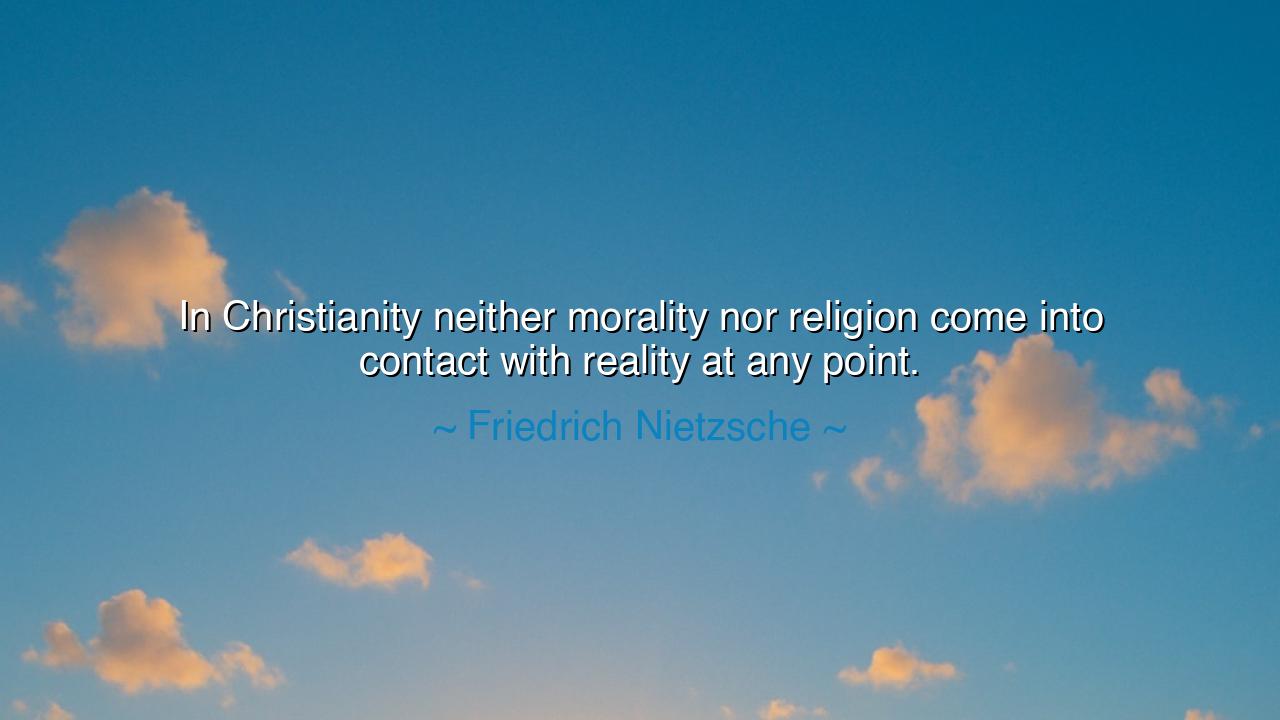
In Christianity neither morality nor religion come into contact
In Christianity neither morality nor religion come into contact with reality at any point.






Hear now, O seekers of truth, the words of Friedrich Nietzsche, who boldly declares: "In Christianity neither morality nor religion come into contact with reality at any point." These words cut deeply into the very fabric of religious practice, questioning the foundation upon which Christianity has stood for centuries. Nietzsche, a philosopher of profound insight and radical thought, is not merely attacking the faith itself, but rather its relationship to the world in which we live. To him, Christianity—and by extension, many religious practices—creates a disconnect from the realities of life, morality, and the very essence of human existence.
In ancient times, the great philosophers, such as Socrates, understood that morality could not be a mere set of external commands imposed by religion. For Socrates, true virtue came from the examination of the self, from an inward search for truth, not from adherence to external laws handed down by the gods. He famously said, "The **unexamined life is not worth living." To Socrates, morality was not something imposed, but something that arose from deep personal reflection on the truths of human nature. Nietzsche builds on this, arguing that Christianity, in its embrace of divine command, cuts off the possibility of authentic, real morality—one that is born not from divine edicts, but from the lived, earthly experiences of the individual.
Similarly, in the teachings of the Buddha, there is a call to examine the suffering that is inherent in the human condition and to find ways to transcend it through wisdom and compassion. Buddhism does not rely on a god or a divine commandment to guide its followers; rather, it emphasizes personal responsibility in confronting reality head-on. The Four Noble Truths and the Eightfold Path speak of finding peace and liberation in this life, not through submission to an external deity but through a deep understanding of one’s own nature. For Buddha, morality was not something dictated by the divine but was rooted in the real experience of human suffering, with a focus on compassion and awareness.
Nietzsche’s critique of Christianity as disconnected from reality can be seen in the life of Jesus Christ as well. Christ's teachings, though revolutionary in their call to love and forgiveness, also created a framework that focused on the afterlife, on salvation, rather than on engaging with the harsh realities of life. Jesus spoke of the Kingdom of God—a concept that transcended earthly existence and promised eternal reward in a spiritual realm. While Christ’s message emphasized moral love and the compassionate treatment of others, it also pointed away from the material world, urging his followers to store treasures in heaven rather than on earth. Nietzsche, with his focus on earthly existence, rejected this focus on the afterlife as a form of escapism, urging instead that human beings face reality directly, and create meaning here and now, through their own actions and choices.
The lesson Nietzsche seeks to impart is that morality should be based on the real, tangible world in which we live, not on abstract ideals or supernatural commandments. He urges us to create a moral framework that does not escape into the fantasy of an afterlife or rely on divine intervention, but one that confronts the reality of our situation and our responsibilities to each other. In the modern world, this message rings as relevant as ever. We live in a time when many still look to religion to dictate moral behavior, but we must ask ourselves: does this religion truly help us face the challenges of our world, or does it distract us from the pressing realities we must address—such as poverty, injustice, and the preservation of the earth?
In your own life, O seekers, consider Nietzsche’s challenge to Christianity and religion at large. Are you living your morality based on a set of divine commandments, or are you grounded in the reality of your own experience and the world around you? Reflect upon how you engage with faith—does it guide you toward a deeper understanding of human suffering and compassion, or does it serve as a way of escaping the harsh realities of life? True morality, Nietzsche suggests, arises from within, from an intimate understanding of human nature and the earthly struggles we face.
So, O seekers, let us embrace the world as it is, with all its imperfections and beauty, and create a morality rooted in this reality. Let us not retreat into religious structures or beliefs that promise salvation elsewhere, but instead face the challenges of life with strength, wisdom, and courage. Create your own meaning, live with integrity, and act in a way that reflects the true nature of the world we live in. In doing so, we will find that our morality is not a set of distant ideals, but a living, breathing expression of the truth we encounter every day.






AAdministratorAdministrator
Welcome, honored guests. Please leave a comment, we will respond soon